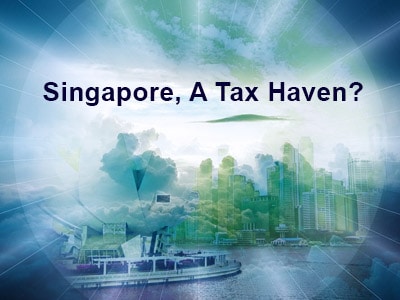Is Singapore Really a Tax Haven?
 When you hear the term “tax haven”, what runs through your mind? The thoughts that cross your mind would be a place where taxes are levied at a low rate or even zero tax rates. Then comes the question of risk. There isn’t a fixed definition for the term, however international organisations such as the Organisation for Economic Cooperation and Development (OECD). In relation to tax matters and the facilitation of tax evasion, the OECD use certain markers for non-transparent or non-cooperative countries. OECD is a forum where governments from 34 democracies with market economies work with each other, alongside more than 70 non-member economies. The aim is to promote economic growth, prosperity, and sustainable development.
When you hear the term “tax haven”, what runs through your mind? The thoughts that cross your mind would be a place where taxes are levied at a low rate or even zero tax rates. Then comes the question of risk. There isn’t a fixed definition for the term, however international organisations such as the Organisation for Economic Cooperation and Development (OECD). In relation to tax matters and the facilitation of tax evasion, the OECD use certain markers for non-transparent or non-cooperative countries. OECD is a forum where governments from 34 democracies with market economies work with each other, alongside more than 70 non-member economies. The aim is to promote economic growth, prosperity, and sustainable development.
Feature of Tax Havens
A tax haven is usually a place with a tax structure that is designed in such a way that it’ll attract companies and individuals from higher-tax jurisdictions to avoid paying taxes in their home countries to incorporate their companies in Singapore. Another attractive feature of tax havens is that it does not require the substantive local presence of the individual or company in that jurisdiction.
The Banking and Finance industry in Singapore is advanced and facilitates a huge amount of wealth management activities with international standards of regulation and compliance. Take for example the people who opine that Singapore is on some kind of ‘list’ of countries like the U.S. because there is a great deal of discussion and engagement on these matters between the government of the two countries. In reality, there’s actually many American investors, entrepreneurs and businesses that come to Singapore to do business. This is the reason why the IRS attempts to engage the Singapore government in their Fair and Accurate Credit Transactions Act (FACTA) activities.
However, FACTA is a US federal tax policy that applies across the board to any country where Americans are present. This was introduced by the Obama administration to increase the efficiency of the US government in enhancing tax compliance of their citizens in regards to their foreign financial assets internationally.
This isn’t an issue to Singapore as our tax system aims to attract substantive economic activities by way of lowering the tax burden on enterprises and individuals. The tax rates for businesses are 17% and the income tax per individual is progressive up to 20%. The tax system is designed in such a way to boost a diversified, knowledge-based economy. This spans across a wide range of economic sectors and is not meant for the rich to merely park their money inactively in Singapore to avoid being taxed back in their home country.
Singapore’s Tax Treaties
The lenient tax system does not mean that the Singaporean government does not regulate its financial system well. There are strict regulations in place to prevent those with ill intentions from abusing the system. This has gained Singapore an internationally-acknowledged reputation of being vigilant against illicit funds. These funds could threaten its integrity. Therefore, Singapore cooperates with international partners and authorities to prevent such criminal abuse.
In its tax treaties, Singapore endorses and implements the internationally agreed Standard for Exchange of Information (EOI Standard) for tax purposes. Singapore is fully in line with the global standards when it comes to the level of tax cooperation that it renders to its tax treaty partners.
In addition, the financial sector in Singapore is characterized by high standards of financial regulation and supervision by the authorities. Singapore practices an open and transparent approach in its banking and financial systems, and rules are rigorously enforced. It is because of the economic and political stability, implemented regulations, and the availability of fund management expertise that many investors choose Singapore as the place to manage their wealth.
Although Singapore has privacy laws which provide the right to the confidentiality of information to the bank customers, this doesn’t prevent the Singaporean authorities from providing information to assist in domestic or foreign authorities for the investigations of potential criminal activities.








